– K. Apoorvananda
When we think of Ramayana, the only thing that comes to our minds is the obedient son in Rama with a face ever so handsome like the morning sun and a villain named Ravana with ten heads and all the magic that happens in between. It is a totally different kind of magic that we see on stage by the artistes of Rangayana as they have adapted Kuvempu’s Sri Ramayana Darshanam on stage. Kuvempu’s magnum opus took nine years to write and it won him several accolades including the Sahitya Akademi Award and the Jananpith Award.
Rangayana Mysuru has till now sold out shows of the epic and they have been received by the audience of Mysuru very well regardless of age group. The drama being directed by K.G. Mahabaleshwar, one of the best exponents of Old Kannada in Karnataka spans five hours and one could observe that crowd which came in towards the beginning of the show did not thin out throughout the duration of the play. Though five hours long, it did not feel lengthy or laborious, taking the audience by a visual treat to Ayodhya, Kishkindha and finally Lanka.
Kuvempu himself appears on stage aptly played by Dhananjaya complete with his wavy hair introduces the play. The play does not take usual route of Rama being born to Kausalya but it starts with the coronation of Rama and Manthara trying to poison the mind of Rama’s step-mother. A small note here in on the character of Manthara. Only in a place like Mysuru can we see the Director of Rangayana, Bhagirathi Bai Kadam, donning a role for such a mega production and that too in a role as pivotal as Manthara. She was earlier seen donning the role of Kamala Devi Chattopadhyaya and she of course pulled off this role with ease.
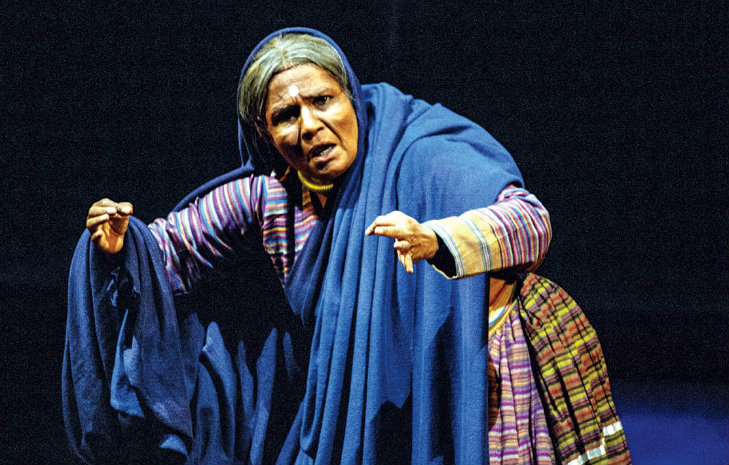
Rangayana Mysuru Director Bhagirathi Bai Kadam donning the role of Manthara in the play ‘Sri Ramayana Darshanam.’
The scenes where Manthara is publicly shamed and Bharatha played by Hoysala takes Rama’s paduka (footwear) to Ayodhya to rule on his behalf till he comes back is particularly moving. Though a significant portion of the play was in Old Kannada, comprehension to a great extent wasn’t any issue as the play was more of a visual treat and wasn’t verbally dominating.
The music was mostly live and was treat to listen to it having used exotic instruments like the didgeridoo and many others all used aptly by Music Director Ravi Murur. A visual treat would not be possible without the excellent lighting design and execution by Mahesh Kallathi. The costumes were very unique. The clothes, accessories and headgear were influenced to a great extent by those of Thailand, Indonesia and Sri Lanka. They were extremely grand and colourful making for a visual extravaganza. I surely had a unique view to this play as I also had an opportunity to photograph the play thanks again to Rangayana, Mysuru.
Coming back to the story line, the poet Kuvempu’s view of the Ramayana seem to be a confluence of the Ramayana story from all three countries. But the most important being that Rama is not shown with superhuman strength or superhuman qualities. He is shown as the crown prince of a State. The winner of the play here is not the divinity but the divine qualities like Rama being an obedient son, a chaste Sita, a dutiful brother in the form of Bharatha etc. In a way, that is what Kuvempu was aiming at. It is not to please the greatness of the Gods but to please the greatness of how one could truly lead a great life and lead by example.
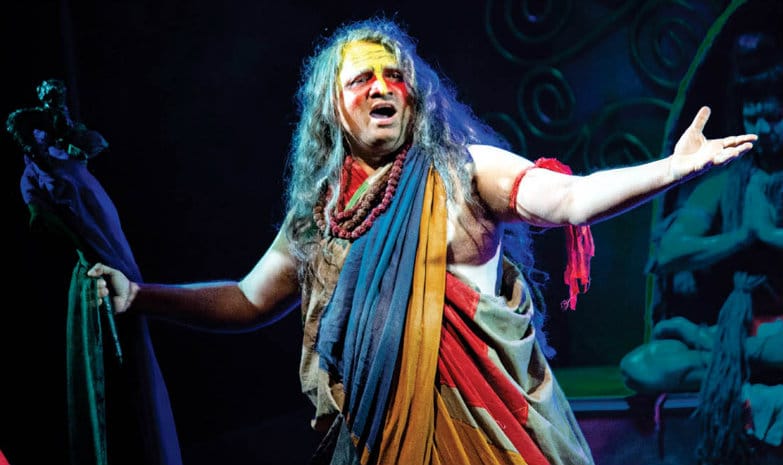
It is not only the aforementioned scenes but there are many others which will remain in my memory for long. The most important among them being that of puppeteer Shravan Kumar who designed puppets for two sequences those being that of Kumbhakarna being woken up for battle and another being the childhood of Vali and Sugriva. The puppetry was not only graceful and in spite of both arts being poles apart, did not feel out of place. This play was a mega production of senior artistes joining hands with youngsters and was hence unique. While Prashanth Hiremath donning the role of the magician Mareecha literally created magic on stage. Ladies like Saroja Hegde and K.R. Nandini blew us away with their feminine charm and grace. The whole play being double cast for easy availability of artistes during out of town shows, there were some characters which were played by a senior artiste and also a junior artiste. For example, Hulugappa Kattimani donned the role of Ravana. Being a senior artiste, his booming voice and his experience was a brilliant sight while youngster Anurag playing the same role enthralled audiences with his exuberance. At the end of the play, we see how Kuvempu’s Ramayana Darshanam is different from any Ramayana composed, be it that of Valmiki or Tulsidas. During the ordeal by fire episode, Rama jumps into the fire hence coming out unscathed along with Sita, hence befitting his title of ‘Maryada Purshotamma’ (A man of dignity and virtues). Kuvempu cared a great deal about social justice, empowerment and equality. By having Rama jump into the fires to join his wife, Kuvempu makes the ultimate statement of empowerment and equality with utmost class and beauty. What astounds me most is that this was written in the most of conservative of times. Had it not been for Kuvempu, his mastery and understanding of the epic, the writer would have surely been ostracised from society.
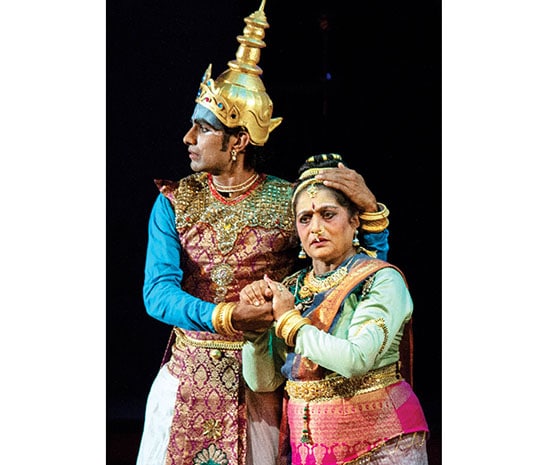
The play was a team effort of more than 50 artiste, both on and behind the stage and no wonder was a success. This is of course a fitting tribute to Rashtrakavi Kuvempu. A finely written epic by a man of class, brilliance and intellectual mastery. Many say he was agnostic but the logic of him being so eludes me. It would have been impossible for someone who was agnostic to put in so much effort into something so beautiful without believing it to be true if not wholly, at least partly. Kuvempu’s Ramayana Darshanam is the ultimate form of worship to a God he so loved and so beautifully described in his epic. It is something only one can see, feel and hear. To conclude, Rangayana Mysuru’s rendition of Ramayana Darshanam activates all your sense to a higher level which itself is a worship to the Lord in its own way.
Two more shows on Nov.28, 29
As the shows of the four-and-a-half-hour play ‘Sri Ramayana Darshanam’ staged from Nov.15 to 18 were houseful, Rangayana, on public demand, had decided to stage the play on Nov.27 and 28 at Kalamandira.
However, following the death of actor Ambarish, the show scheduled for tomorrow (Nov.27) will be staged on Nov.29. For details, contact Rangayana on Ph: 0821-2415905.



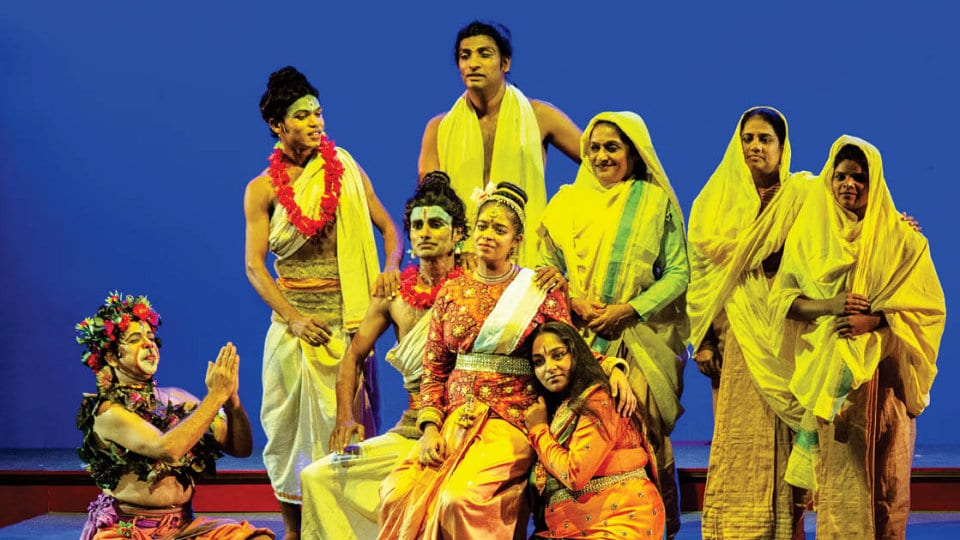
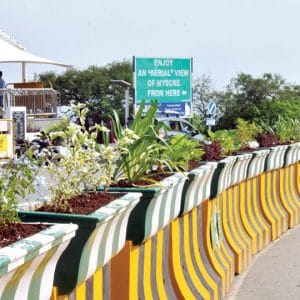

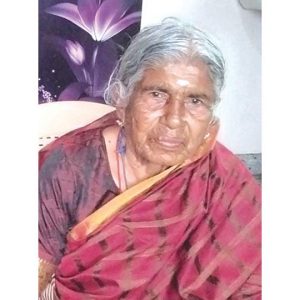
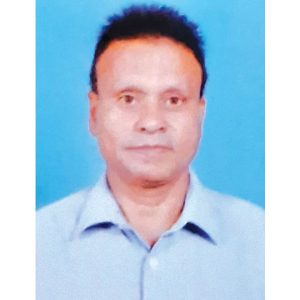
Recent Comments